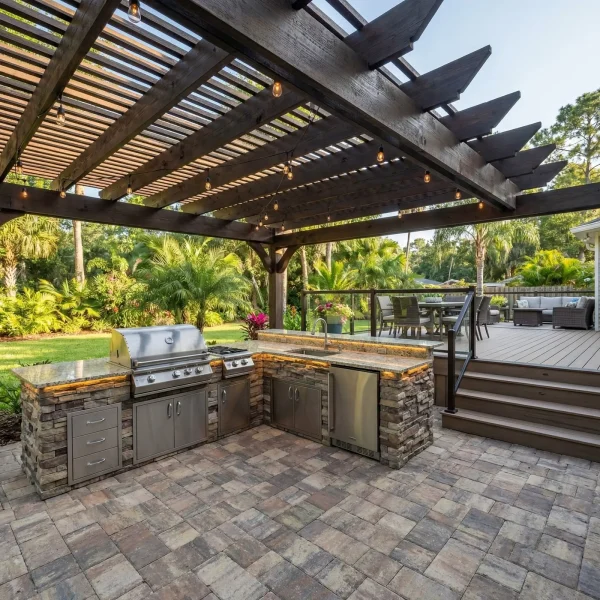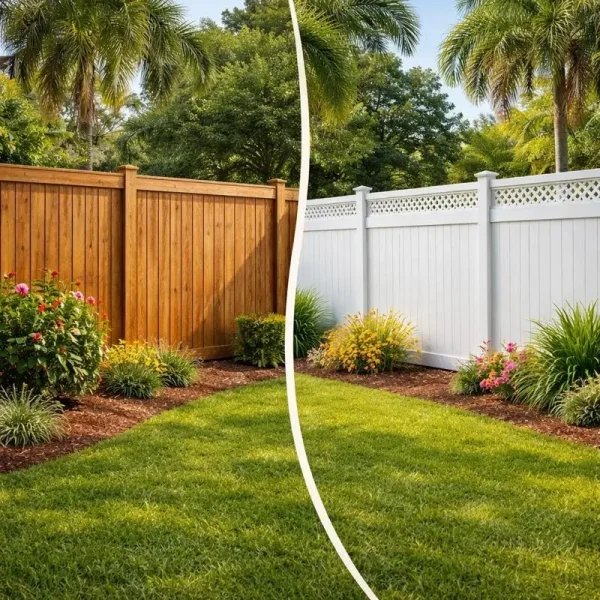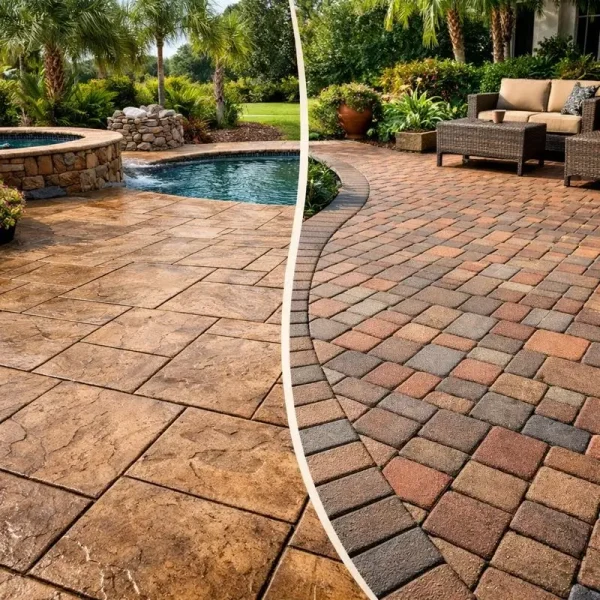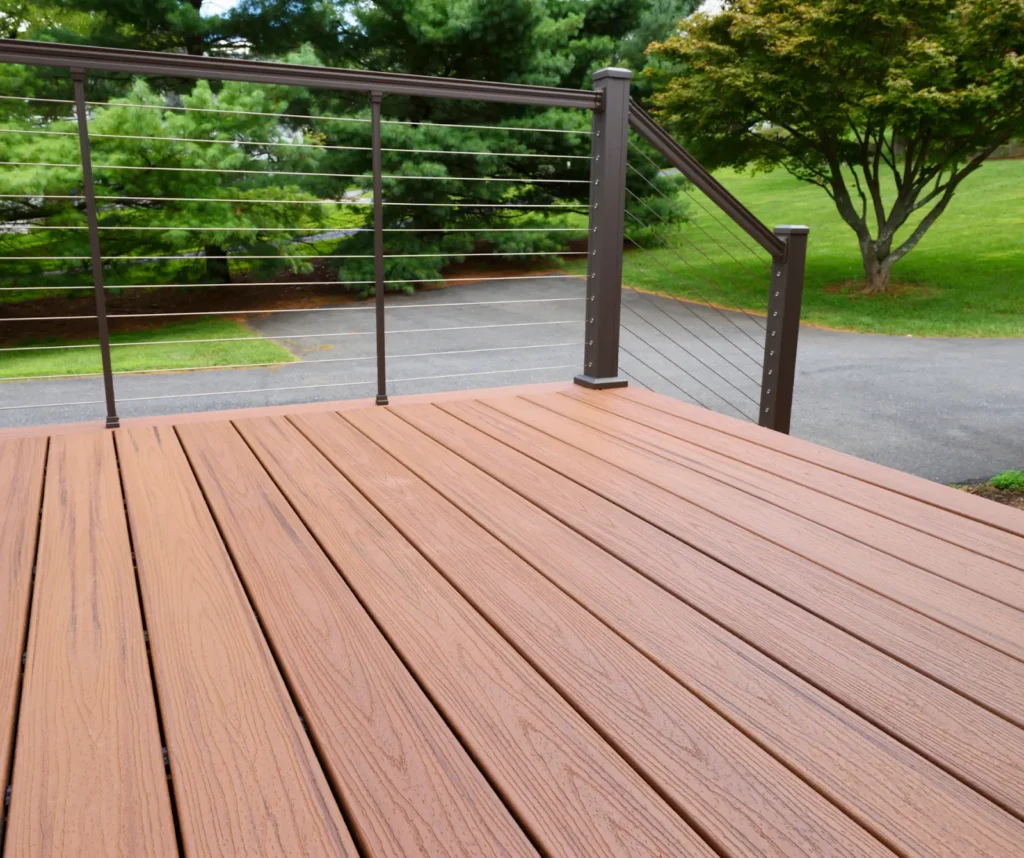
Composite Decking vs. Wood: Pros and Cons for Florida Homeowners
If you’re planning to build or replace a deck in Florida, one of the first questions you’ll face is this: composite or wood? It’s a decision that goes far beyond looks, although many stay loyal to the latter for its natural aesthetic.
Between Florida’s heat, humidity, rain, and salt air, the material you choose can affect how long your deck lasts, how much maintenance you’ll need, and whether your investment holds up over time.
Stop Dreaming.
Start Building Today!
In this article, we’ll walk through the pros and cons of composite and wood decking, inspired by the experiences of homeowners who’ve lived with both in Florida. Whether you’re chasing low-maintenance living or you love the feel of real wood underfoot, you’ll find the clarity you need to build smart.
Coastal Outdoor Construction has been one of the most trusted deck contractors in Jacksonville and Duval County for almost two decades. They offer free removal of your old deck and $250 discount for any deck material you choose.
1. Composite vs. Wood: Material Durability
When you’re deciding between composite decking and pressure-treated wood, the first thing to consider is how each material handles Florida’s brutal climate. Jacksonville decks face serious wear and tear from heavy rains, long summers, and salty air.
Pros of Composite Decking
- Moisture-resistant: Composite boards don’t absorb water like wood, which helps prevent rot, warping, and swelling, especially useful in humid, rainy areas like Northeast Florida.
- Insect-proof: Bugs, especially termites and carpenter ants that devour wood, don’t stand a chance against composite.
- No splinters or surface cracking: The capped surface of composite decking stays intact longer, even in harsh sun.
- Good warranty coverage: Brands like Trex offer solid fade and stain warranties of up to 50 years, which gives peace of mind if you’re in your home long-term.
Composite Decking Durability Cons
- Gets hot: In high summers, some composite decks can become uncomfortable to walk on barefoot. Darker colors heat up faster. And you may have to wear flip-flops.
- Early versions had issues: Homeowners with older composite decks often reported fading, mildew, and surface breakdown, though most of these issues are addressed in modern boards.
- Not structurally strong: Composite boards need closer joist spacing (usually 12″ to 14” OC), which adds to labor and framing cost.
Pressure-Treated Wood Durability Pros
- Cooler underfoot: Some homeowners (and pets) prefer wooden decks on Florida’s sunny days, as it stays more walkable than many composite surfaces.
- Natural look and feel: For homeowners who love the look of real wood grain, pressure-treated pine and cedar still win on charm.
- Lower upfront cost: If you’re building on a budget or flipping a house soon, wood costs significantly less at the start.
Pressure-Treated Wood Durability Cons
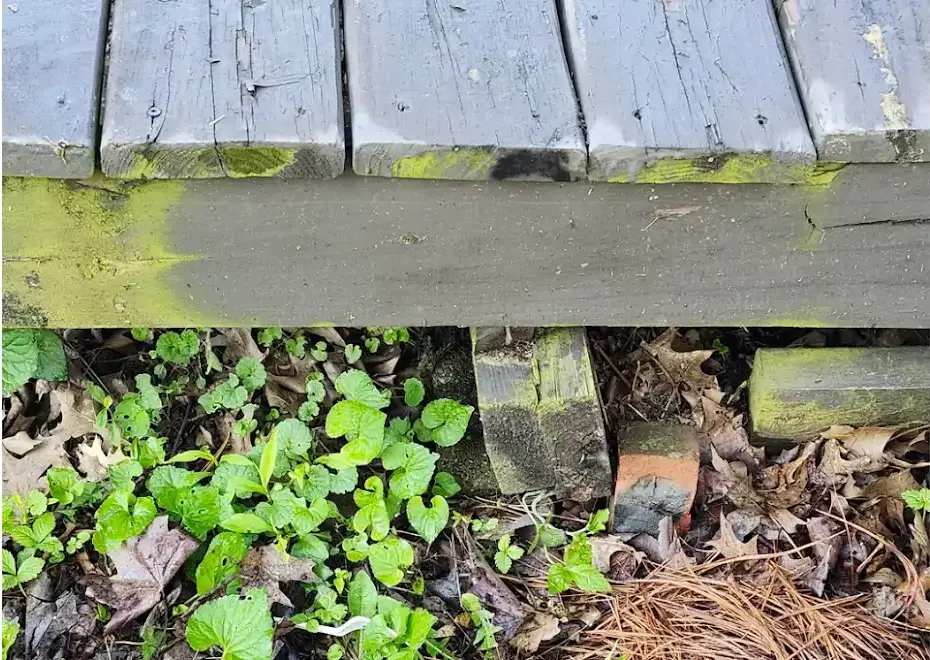
- High maintenance: Expect to seal and stain your wood deck every 1–2 years, or risk mold, cracking, and rot.
- Vulnerable to pests and moisture: Without consistent upkeep, wood becomes a haven for termites, mildew, and decay, especially near the ground or in shaded, damp areas.
- Shorter lifespan: Even well-maintained wood may need replacing or major repairs after 10–15 years in Florida conditions.
2. Maintenance Requirements
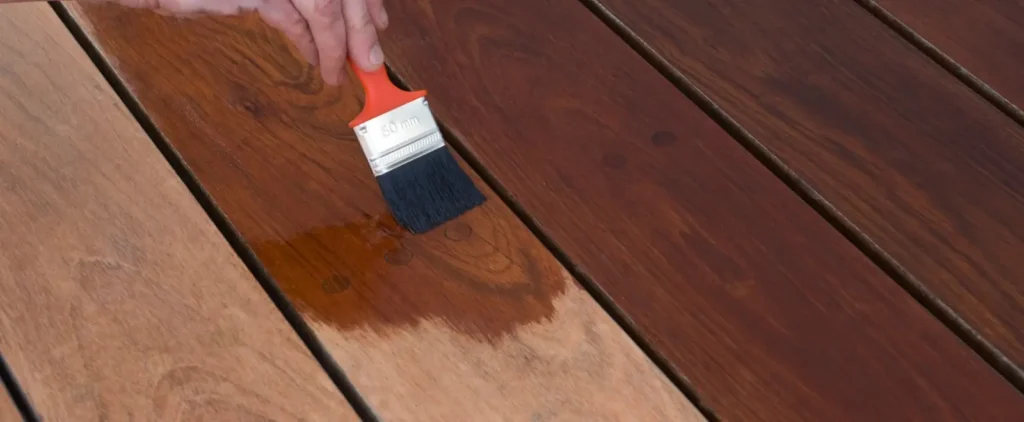
How much work are you willing to put into your deck every year? This is where composite decking material separates itself, however, it comes with a few caveats.
Composite Decking Maintenance Pros
- Low maintenance: No staining, sealing, or sanding. Just occasional cleaning with soap and water.
- Stays looking new longer: Composite boards resist splintering, fading, and general wear far better than wood, especially in sun-exposed areas.
- Easier upkeep over time: Florida homeowners appreciate not having to deal with peeling sealant or algae build-up as frequently.
Composite Decking Maintenance Cons
- Not completely maintenance-free: You still need to hose off debris, clean mildew from shaded areas, and sometimes pressure wash — carefully.
- Repairs can be tricky: Damaged composite boards are harder to replace than wood and may not match if you’re using a discontinued color.
Pressure-Treated Wood Maintenance Pros
- DIY-friendly: If you’re handy and don’t mind seasonal upkeep, maintaining a wood deck can save money.
- Easy to repair: One warped or cracked board? Just swap it out. No matching issues or custom orders.
Pressure-Treated Wood Maintenance Cons
- Frequent sealing and staining: Expect to power wash and reseal every 1–2 years to prevent rot and UV damage.
- Prone to mold and mildew: Especially in shady or damp areas, wood needs constant attention to keep it from turning green or black.
- Maintenance costs add up: Over a decade, the money and time spent keeping a wood deck in shape can rival what you’d spend on composite upfront.
3. Initial Cost and Long-Term Value

Your budget might point you toward wood right now, but your future self might have different feelings after a few years of upkeep. However, if you don’t mind the hassle and cost of maintenance, Ipe and Cedar wood decks are perfect in Florida. Get a free decking cost consultation from Coastal Outdoor Construction Jacksonville.
Composite Decking Economy Pros
- Lower lifetime cost: While composite decking can cost nearly twice as much upfront, you save on labor, materials, and time over the years. No staining, no board replacements, no costly sealing every other season.
- Boosts resale appeal: Many buyers see a composite deck as a premium upgrade, especially in areas like Florida, where weather wear is a concern.
- Warranty coverage: Trex and other major brands offer 25–50-year warranties for fading, staining, and structural integrity.
Composite Decking Economy Cons
- High initial investment: Expect to spend more per board, plus potentially more for joist reinforcement (e.g., 12″ OC spacing required for many brands).
- Costly repairs: If a board gets damaged, replacing it isn’t as simple, and some discontinued colors are hard to match.
Pressure-Treated Wood Economy Pros
- Lower upfront cost: Wood is significantly cheaper at the point of purchase, and can be a smart short-term choice for small projects or tight budgets.
- More flexible for DIY: Homeowners comfortable with tools can save on labor costs by installing or repairing wood themselves.
Pressure-Treated Wood Economy Cons
- Ongoing expenses: From cleaning supplies and sealant to occasional board replacements, maintenance adds up, often surpassing the initial cost savings over time.
- Resale uncertainty: Buyers may view wood decks as “projects in waiting,” especially if signs of wear are visible. You may need to refresh or refinish the deck before listing your home.
4. Wood vs. Composite Deck: Safety Considerations

For Florida homeowners, long-term deck safety isn’t just about slip-resistance and load bearing — it’s about what survives salt air, sudden storms, and relentless humidity without becoming a hazard underfoot. If you’re looking for a deck contractor in Jacksonville that offers professional installation and workmanship warranties.
Composite Decking Safety Pros
- Low-maintenance surface: Most composite boards only need light cleaning with soap and water. No sealing, no staining, and no sanding.
- Slip resistance (varies by brand): Many newer composites include textured surfaces that improve traction, especially under wet conditions.
- No rot, no pests: Termites won’t touch it, and moisture doesn’t break it down like wood.
Composite Decking Safety Pros
- Can still be slippery: In heavy rain or dew, especially on older models or lower-end boards, slickness is a real complaint. Dogs and kids are especially vulnerable.
- Not invincible: Scratches can’t be sanded out like wood, and if a board is damaged, color-matching replacements may be difficult.
Pressure-Treated Wood Safety Pros
- Naturally slip-resistant when new: A fresh wood surface provides good grip underfoot and can be sanded to refresh the texture.
- You can fix flaws: Boards that crack or warp can be planed, sanded, or flipped.
Pressure-Treated Wood Safety Cons
- Prone to warping and rot: Over time, even well-maintained wood can shift, buckle, or grow mold in humid conditions, making it unstable or hazardous.
Conclusion: Choose the Deck Material That Works for You
Both composite and wood have their place, depending on what matters most to you.
If you’re building a deck you want to enjoy with as little maintenance as possible, composite might be the better fit, even with the higher upfront cost. But if you love the classic feel of natural wood and don’t mind the upkeep, pressure-treated lumber can still give you a beautiful, functional space in Florida’s climate.
At Coastal Outdoor Construction, we help Florida homeowners make the right call — no pressure, just expert advice based on what’s best for your home and budget.
Contact us today for a free consultation, and let’s plan a deck that works for the way you live
FAQs: Composite vs. Wood Decking in Florida
It can be, especially darker colors under full sun. But that’s also true for wood decking, reaching higher surface temperatures than some composite boards. Lighter composite colors and partial shade structures can make a big difference. Today, many composite board brands also offer boards with advanced UV-protection, Trex SunComfortable, and MoistureShield’s CoolDeck technology to keep your deck cooler on hotter days. Most Florida homeowners just plan on flip-flops or outdoor rugs when the sun’s at full blast.
Not without consistent upkeep and on elevated surfaces. Between the heat, rain, and moisture from the ground, wood decks in Florida are prone to mold, warping, and rot, especially in shaded or poorly ventilated areas. Wood is a classic deck material if you commit to sealing and cleaning it every couple of years. But skipping maintenance, especially with signs of wear, can drastically shorten its lifespan and appeal.
No, it’s not hype, composite decking requires almost zero maintenance other than occasional cleaning with water and dish soap – no staining, sealing, or sanding. With simple cleaning, composite materials can last as long as 50 years, even in direct contact with the ground.
It depends. Potential home buyers often see it as a premium upgrade in good condition and a professional installation, where “low-maintenance” is a selling point. But if it’s a lower-end brand or hasn’t held up well, it won’t carry the same appeal. A well-installed composite deck from a trusted builder like Coastal can help your home stand out in the real estate market.
That’s one of the most common requests we hear. Luckily, modern composite boards come in finishes that closely mimic real wood, with texture, grain, and natural-looking tones. You can get that rustic charm without the annual sanding or sealing. If you’re unsure, we can show you side-by-side samples during your quote.
Written By:
Coastal Outdoor Construction
Let's Talk About Your Decking Project
After we get some information from you, we’ll set up a time to discuss your project in further detail.




